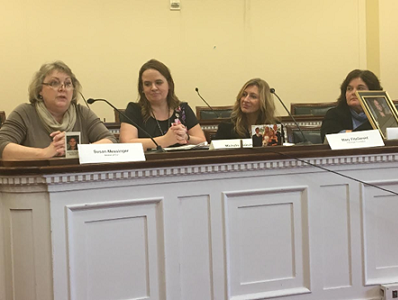Press Releases
Kuster Hosts Susan Messinger in Washington to Discuss Advocacy, Reintroduce Carl’s LawSusan Messinger: I don’t want anyone else to have to go through the hell that my family and I have lived the last 28 months and 5 days.
Washington, DC,
March 1, 2017
This week, Congresswoman Annie Kuster (NH-02) hosted Susan Messinger, mother of Carl Messinger, who tragically passed away from an overdose, to discuss her advocacy on behalf of those seeking treatment and recovery services. Kuster also reintroduced her legislation, Carl’s Law, which would require labeling about the presence of opioids in medications. Carl died of a fentanyl overdose after he relapsed when he was prescribed an opiate medication while in recovery by a physician unaware of his history of addiction. If Carl’s medication had featured a warning label, his relapse and death could have been prevented. Kuster and Susan have been taking part in CARA Family days, a series of events hosted by the Addiction Policy Forum. Yesterday, Congresswoman Kuster chaired an Addiction Policy forum with family members of people who died of overdoses. “It is important to provide a forum for families and communities impacted by this crisis to educate the public on the importance of addressing opioid use disorders,” said Congresswoman Kuster. “I commend the Addiction Policy Forum for helping put this event together, and I thank the family members of victims for so bravely sharing their stories of loss, recovery, and support. Their courage is remarkable and inspiring. Hearing from those impacted by loss due to addiction is critical to making sure Congress continues to take this issue seriously and advance policies to expand access to treatment, recovery, and education services.”
Congresswoman Kuster hosts a panel of family members who have lost loved ones to overdoses High resolution version of the photo is available here This morning, Susan Messinger spoke to a group of Congressional staff and families of victims and survivors. “I knew shortly after Carl died that I needed to do something to change what was happening in our communities, states and country,” said Susan Messinger. “We need to put services in place to help these young people and families before it is too late. Resources need to be made available in all six key elements of a comprehensive response to addiction: prevention, treatment, recovery, overdose reversal, law enforcement and criminal justice reform. I don’t want anyone else to have to go through the hell that my family and I have lived the last 28 months and 5 days.”
Susan Messinger testifying to Congressional staff, families of victims & survivors High resolution version of the photo is available here In fall 2014, Carl Messinger had successfully completed a rehab regime for heroin use and was on the path to full recovery. To treat an upper respiratory infection, Carl was prescribed a cough syrup that unbeknownst to him contained codeine, an opioid. Tragically, the opioid in the cough syrup triggered Carl’s addiction and shortly thereafter he passed away from an overdose of pure fentanyl. In his honor, Rep. Kuster introduced Carl’s Law during the 114th Congress, to direct the Food and Drug Administration to require a label on the packaging of any medication that could lead to ‘drug seeking behavior.’ Last year the FDA took a first step toward implementing a similar policy by requiring a warning about the presence of opioids on the instructions for the medication. Susan Messinger also was Congresswoman Kuster’s guest at President Trump’s address to a Joint Session of Congress last night. Kuster invited Messinger to remind President Trump of the importance of supporting recovery and treatment services for substance use disorders.
Congresswoman Kuster with Susan Messinger before President Trump’s address to congress High resolution version of the photo is available here Congresswoman Kuster is the co-founder and co-chair of the Bipartisan Heroin Task Force, and has been at the forefront of the fight to address the heroin and opioid crisis at the federal level and in New Hampshire. She has been an outspoken advocate for the need to support medical, law enforcement, treatment, and recovery efforts. ### |



